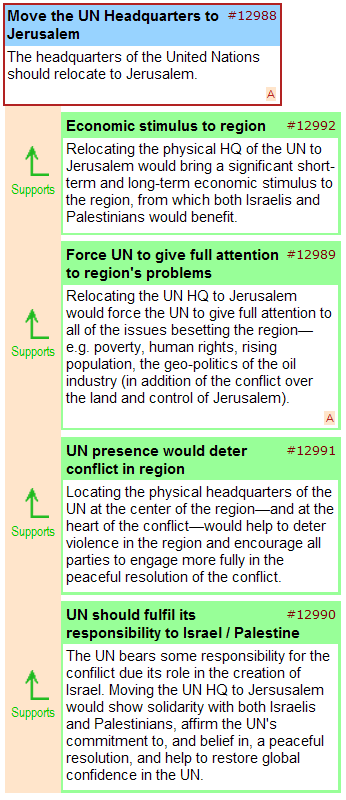Visualizing Middle East Peace
The events in Israel and Gaza this year have prompted gloomy prognoses for the prospects for peace; a mood deepened by the mixed signals from the Israeli election and the latest developments with Iran.
Lord Patten, writing for European Voice last month, struck a particularly bleak note:
"However tough things looked in the past, I have never felt such a sense of despair about Palestine and Israel. Reason has been drowned in blood. It seems as though the politics of hope have given way to the politics of the cemetery. Poor Palestine. Poor Israel."
Independent readers and the Debategraph community have started to explore the options for peace in the Middle East over the last few weeks, and, though the map is still at an early stage of development, it already provides a succinct insight into the nature and scale of the challenge; showing how strong views at either end of the spectrum pull the peace proposals towards the gyre of despair.
One of the advantages of visual mapping in this context, though, at least at the outset, is that it’s not asking anyone to take sides: just asking everyone to pool their understanding to map the contours of the problem.
The visual mapping process also opens up the possibility of creative brainstorming and lateral suggestions, such as the proposal to relocate the UN headquarters to Jerusalem, illustrated below – and we would like to see more contributions of this kind as the map develops over the coming weeks.

Given the progress made with the map so far, and the work still ahead, we’re extending the first mapping phase through the spring, and, will be including other partners in the process as we seek to engage the main actors in the region.
Anyone who would like to join us in this process is welcome to do so, and, if you would like to involve your own blog or website readers in the debate, you can embed the map—like a YouTube video—using the embed code shown below:
<iframe src=’http://debategraph.org/flash/fv_indep.aspx?r=11474&d=2&i=1′ frameborder=’0′ width=’490′ height=’650′ scrolling=’no’></iframe>
In the meantime, I will be examining different areas of the map in detail on the blog over the coming weeks and will present the mapping community’s work-in-progress to a conflict resolution forum in Haifa later this year.
Cross Posted at: Independent Minds
Mapping the IQ2 Green Festival on Climate Change
This Sunday I’ll be live mapping the debates at the marvellous IQ2 Green Festival on Climate Change at the Royal Geographical Society in London.

The festival, for which tickets are still available, has assembled a fascinating group of climate change speakers, including: Professor Mohan Munasinghe, Sir David King, Stanley Johnson, Professor Chris Rapley, Joan Ruddock, The Viscount Monckton of Brenchley, Mark Woodall, Tony Juniper, Fiona Harvey, David Bellamy, Malini Mehra, Christine Loh, Isabel Hilton, Jonathon Counsell, Steve Koonin, Jeremy Leggett, Tom Burke, Ed Crooks, Michael Keating, and Oliver Tickell.
The full schedule encompasses a mixture of debates, seminars, and panel discussions, including: Climate change is the greatest threat to humanity, Countdown to Armageddon – how long have we got?, Can Asia go green? Can technological innovation save us from disaster?, Green Herrings – what we need and needn’t bother doing, Biofuels – essential or a waste of time, UK political parties aren’t serious about climate change, Green Capitalists – a contradiction in terms?, Geoengineering – is it the silver bullet? Renewables – wind, solar & other – are they worth the bother?, and Bioperversity: An obituary for the world’s rainforests and other major ecosystems?
I’ll be aiming to map as many of points being made by the speakers on the day, and building on the initial seed maps over the subsequent days—and you’ll be able to follow the maps developing online on the IQ2 Green Festival website and on the Debategraph home page.
The current work in progress on the existing climate change map is shown below:
Feel free contribute to the debate maps from afar as they are developing, and if you are planning to attend the event with a laptop, join in and we can use the maps as an intelligent, multi-dimensional conference back channel.
I’m delighted to report as well that Anna De Liddo will be joining me to map the debates, and that Anna and I will be using the maps as one of the first building block in this year’s ESSENCE Collective Intelligence project on Climate Change in the build up to the UN Climate Change Conference in Copenhagen at the end of this year.
Many thanks to Edie Lush and her team for conceiving and organizing the festival—and if you are planning to attend, don’t forget to say hello!

